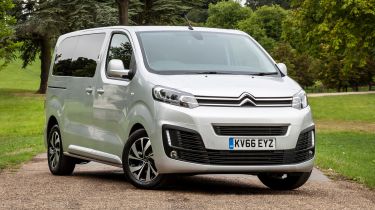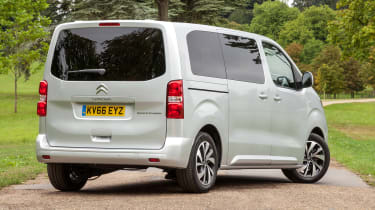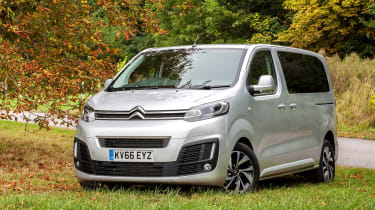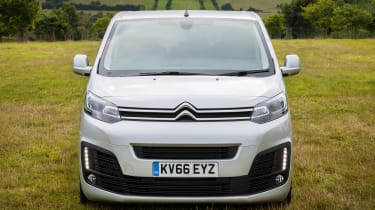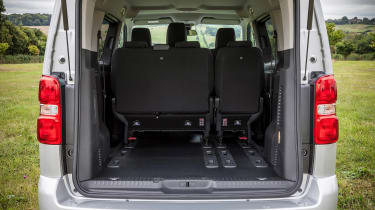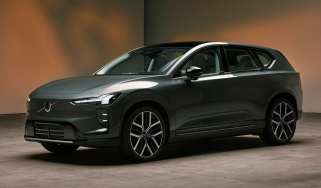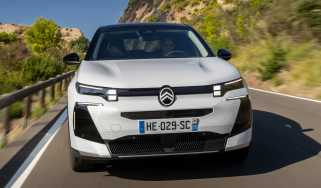Citroen SpaceTourer review
Citroen’s SpaceTourer MPV trades on its big capacity and masks its van origins well

Big MPVs aren’t exactly the flavour of the month in the modern car market. These days it’s all about SUVs and crossovers, the more substantial of which come in seven-seat guises to cater for larger families. That’s all well and good, but if you really need a load of space in your family vehicle, say for six to eight adult-sized passengers or serious consignments of cargo, even the biggest 4x4s are going to struggle. This is where models like the Citroen SpaceTourer come in.
From its position at the top end of the family car market in terms of outright capacity, the Citroen SpaceTourer is designed as a utility vehicle for family use or for businesses needing to carry up to 9 passengers in comfort. Because of this dual-role capability, and like the majority of its competitors in this sector, the SpaceTourer sits astride the passenger car and commercial vehicle markets.
• Best people carriers and MPVs
The van version is known as the Citroen Dispatch and it comes in a passenger carrying guise called the Dispatch Combi. Then you have the SpaceTourer, which is firmly rooted on the passenger car side of Citroen’s range and offered in Feel or Flair trim levels, as well as Business and Business Lounge specs to appeal to business customers wanting something plusher than a minibus.
Used - available now

2021 Volkswagen
Polo
51,000 milesAutomaticPetrol1.0L
Cash £13,795
2019 BMW
X1
53,170 milesAutomaticDiesel2.0L
Cash £13,800
2020 BMW
1 Series
22,183 milesAutomaticPetrol1.5L
Cash £19,500
2022 Citroen
C3 Origin
10,601 milesAutomaticPetrol1.2L
Cash £13,300That brings us to the rivals that face off against the Citroen SpaceTourer, and key amongst them are the big Citroen’s sister cars, the Peugeot Traveller and the Toyota Proace Verso. All are rebadged versions of essentially the same vehicle with only specification differences separating them. Just as it is with the Citroen Dispatch, its sister cars are available as vans: the Peugeot Expert and Toyota Proace.
Aside from these, Volkswagen’s Caravelle and the Mercedes V-Class offer a slightly more upmarket (and expensive) passenger carrying solutions while their respective commercial vehicle versions - the VW Transporter Shuttle and Mercedes Vito Tourer - off less polish and a lower price. There are also models like the Hyundai i800, Ford Galaxy or one of those aforementioned big seven-seat SUVs.
As well as the four trim levels, the SpaceTourer comes in three lengths - XS, M and XL offering progressively more space. There are also four BlueHDi diesel engine options and four gearboxes. The 1.6-litre BlueHDi 95 diesel opens proceedings with 94bhp, then there’s the more powerful 113bhp version of the same unit dubbed BlueHDi 115. The BlueHDi 150 is a 2.0-litre diesel engine with 148bhp and the range-topper is the BlueHDi 180 with 177bhp. As standard, all models get a six-speed manual gearbox except the BlueHDi 95 which has a five-speed manual and the BlueHDI 180, which gets Citroen’s EAT6 automatic. There’a also a ETG6 robotised manual gearbox available on the entry-level engine.
If space is what you need, the Citroen SpaceTourer has it in abundance. Its commercial vehicle origins lend it a simple, robust feel and great practical touches but Citroen has successfully sanded down the rough edges too. Smart looks, plenty of useful technology and an excellent adaptable seating system mean it doesn’t obviously feel like a van.
The drawbacks in comparison to other big seven and eight-seat options are a ride that’s sometimes less than composed and high noise levels in the cabin. The smallest Space Tourer XS models also lack luggage space when all seats are being used. Overall it’s a very capable, good value utility vehicle.
Engines, performance and drive
Cars based on vans are nothing new, but in years gone by the link would have manifested itself clearly in a somewhat rough and ready driving experience. The Citroen SpaceTourer is far better than that on the road.
Ride quality is generally good enough but there are times when the rear end crashes and bangs a bit over bigger bumps, particularly with a heavy load on board. Show the SpaceTourer a smooth A-road or motorway and you won’t get too many complaints from your passengers. Noise is a bigger bugbear and although the 2.0-litre BlueHDI 150 engine we tried was reasonably hushed, there’s quite a lot of wind and road noise at high speeds.
On twisting roads, the big Citroen feels planted and you get none of the floating sensation over undulations that you may sometimes experience in a more softly-sprung people carrier like the Volkswagen Caravelle. You can feel the weight shifting around in sharper corners but things don’t get too unsettled.
The SpaceTourer’s distinctive looks are achieved in part via a high bonnet and quite a narrow windscreen. It means that visibility isn’t always ideal but even the entry-level model gets rear parking sensors and the higher-spec Flair versions have Park Assist and Citroen’s 180-degree Visio Park camera system which makes reversing a doddle.
Around town and on the open road, the high driving position and light steering make the SpaceTourer easy to drive. A little bit of extra steering accuracy around the straight ahead would help position the vehicle more easily at high speeds, and the manual gearbox could be a little less notchy in its action, but generally it’s a strong showing.
Engines
Citroen’s BlueHDI engines offer impressive economy coupled with low CO2 emissions – but are less strong in terms of performance. The range opens with the 1.6-litre BlueHDI 95. Its 94bhp power output results in an extremely longwinded 15.9-second 0-62mph time. If at all possible, it’s better to upgrade to at least the BlueHDI 115 unit where you get 114bhp and a more respectable 300Nm of torque (up from the 210Nm of the entry-level unit).
Our pick of the engine range would be the 2.0-litre BlueHDI 150. With 148bhp and 370Nm, it’s far better equipped to cope with the SpaceTourer and the kind of loads it’s designed to carry. Here the 0-62mph time is 11 seconds and there’s more than enough oomph for the car to hold its own on the motorway with six adults and luggage on board. The range-topping BlueHDI 180 engine offers 177bhp and 400Nm but the 0-62mph time is the same – possibly as a result of the standard EAT6 automatic gearbox.
MPG, CO2 and Running Costs
The Citroen SpaceTourer’s BlueHDi engines offer good fuel economy and official combined cycle returns don’t tail-off as you ascend the engine range, either - another reason to get the most powerful engine you can afford. You’re looking at 51.4mpg from the 94bhp unit with CO2 emissions of 144g/km, but both the 113bhp and 148bhp engines do better with 54.3mpg and 53.3mpg respectively. The worst performer is the 47.9mpg range topper with its automatic transmission. Citroen’s S&S stop-start system is fitted as standard and there’s a 70-litre fuel tank.
Insurance groups
Insurance groups aren’t available yet for the SpaceTourer but all models have an alarm and remote central locking.
Depreciation
Van-based MPVs aren’t the height of automotive fashion but there’s a robust second-hand market for seven or eight-seat vehicles propped up by families who find themselves unable to fit everyone in anything else. The SpaceTourer is still too new for accurate residual values to be calculated but we expect it to hold up relatively well, if not quite on the same level of its more upmarket Mercedes V-Class or VW Caravelle rivals.
Interior, design and technology
Designers only have so much room for manoeuvre when working on an eight-seat van but the SpaceTourer doesn’t look or feel too much like a commercial vehicle from any angle. The boxy exterior lines culminate in soft, rounded edges while the high bonnet and blistered wheelarches all help add interest. The sweep of Citroen’s attractive current headlight and double chevron grille treatment sets off the front end and below, a large grinning air-intake houses the daytime running lights.
Inside, the SpaceTourer plays things a little safer. The necessities of a working vehicle cabin are that it has to be tough and practical first and foremost so attention-grabbing features and chintzy materials are in short supply. Citroen has a tendency to neglect the basics when piling the glitz and glamour into its passenger cars so the more straightforward approach of the SpaceTourer is refreshing. The plastics are tough but build quality seems solid.
It isn’t too basic, mind. There’s some chrome detailing around the air vents and on the lower part of the two-tier dash while the air-conditioning switches are a neat touch. Even entry-level models get a seven-inch touchscreen, rear parking sensors, automatic lights, automatic wipers and air-conditioning.
Sat-nav, stereo and infotainment
All models get the seven-inch touchscreen infotainment system with DAB radio, Bluetooth handsfree and a USB connector. The system has Mirrorlink, Apple CarPlay and Android Auto, so connectivity shouldn’t be an issue. With a bit of practice, the menu system is easily navigable.
In the entry-level models satellite navigation is a £600 option but it comes as standard with Flair trim along with a HiFi Pack that upgrades the stereo with extra speakers.
Practicality, comfort and boot space
What we have here is a five-door vehicle in the van mould with conventional front doors, sliding doors on each flank and a huge tailgate at the rear. The driving position is high so you clamber up a little to get that commanding view of the road and access to the middle row is very easy thanks to those wide-opening side doors. Getting into the third row isn’t so simple as the outer middle row seats don’t tumble forward. All you can do is slide these seats forward and fold the backrests down, meaning it’s still a little bit of a tight squeeze.
It’s also worth noting that the only windows that open are those in the front doors, unless you go for the smallest XS model which has slide-opening windows in the sliding side doors. Passengers in the middle and third rows of the larger models have to make do with the air-conditioning, for which there is an additional control panel above the middle row.
The Easy Entry Pack is a £1,400 option that’s standard on higher-spec models and includes keyless entry and start as well as electric motors for the sliding side doors. This enables the side doors to be opened ‘hands free’ with the waggle of a foot under the sill but we were less than impressed with their responsiveness and speed. They seemed reluctant to close at a pull on the door handle and to stop closing when they meet any resistance. One to leave on the options list, we think.
Storage is plentiful with a couple of door pockets in the front doors capable of housing objects of different sizes, a flip-top tray in the top of the dash and both a shelf and a refrigerated glovebox ahead of the passenger.
One significant practicality failing was the small central cubby next to the USB connection point. It’s the obvious place to locate your phone but isn’t big enough to fit a moderately large handset without depositing it on to the floor during sharp direction changes. Our phones ended up in the dash-top cubby where there’s no charging access.
There are plenty of power sockets elsewhere in the cabin with both a 12V socket and a three-pin household plug connector in the second row plus another 12V outlet alongside the rear-most seats.
Size
In typical van style, there are three different lengths of SpaceTourer available. The XS model has the short wheelbase and is 4,606mm long in total. Whereas the M version and the XL have the longer wheelbase measurement and total lengths of 4,956mm and 5,308mm respectively.
All versions are 1,920mm wide without the door mirrors and the heights vary between 1,890 and 1,940mm depending on model so you’ll get them into most multi-storey car parks. For reference, a standard VW Caravelle’s dimensions are 4,904mm long, 1,904mm wide and 1,970mm tall.
Leg room, head room & passenger space
Headroom will not be an issue in any of the seats unless you’re well over six-foot, but the amount of legroom depends on the SpaceTourer version and the configuration of its slick rail-based seating system. The XS models can just about seat eight adults, but there’s limited boot space left over when the seats are positioned to do this. In the M versions you can get eight in and quite a bit of luggage, while the XL models can manage those passengers and a big bag each thanks to its 350mm of extra rear overhang.
It’s actually possible to seat nine in the SpaceTourer with the double front seat offered in the Business editions, but that middle front berth is highly cramped and would really only be useful for short trips.
Boot
At the rear, you’ll need to leave enough room to get the tailgate open because it’s extremely long when opened up. The alternative in more confined environments is getting at what’s in the back through the separate window hatch.
When you do get the whole tailgate open, there’s a low loading lip and a huge aperture so getting stuff inside is simple. The amount of space depends on how the seats are positioned but Citroen quotes 397 litres for XS models, 507 litres for M models and 554 litres for the XL. The space is quite tall however and XS models in particular are lacking in floor space.
The seats can, of course, be lifted out entirely and without its third row, the M has a vast 2,281-litre boot. The seats are weighty items but take them all out and you bring the SpaceTourer back very close to its Citroen Dispatch van cousin.
Reliability and Safety
The Citroen SpaceTourer has yet to appear in our Driver Power survey as its still too new to have meaningful reliability data available.
It was tested by Euro NCAP in 2015 and received a five-star rating with 87 per cent for adult occupant protection and 91 per cent for child occupant protection. Standard safety kit includes Hill Start Assist, tyre pressure sensors and a comprehensive suite of airbags although the entry-levels miss out on full curtain airbags along the flanks. All the rear seats have ISOFIX points and these are particularly easy to use with wide plastic surrounds to slot the child seat connectors into.
Higher-spec Flair models get a head-up display and adaptive cruise control as standard, but other models combine it with Active Safety Brake as part of a £450 Driver Assist Pack. That seems well worthwhile.
Warranty
Every new Citroen gets a three-year warranty that’s made up of two years unlimited mileage cover and a further year with a 60,000-mile limit provided by your dealer. There’a also a 12-year anti-perforation and three-year paint warranty package. It’s all pretty standard for the market but many manufacturers offer more.
Servicing
The Citroen Servicing deal is available up to a year from your car’s first registration date and lets you pay in advance for all services up to three years or 35,000 miles.

